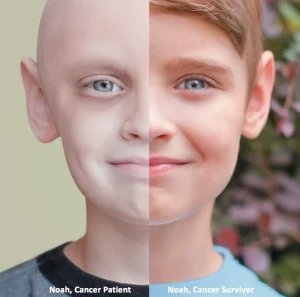
Diagnosed with Cancer? Your two greatest challenges are understanding cancer and understanding possible side effects from chemo and radiation. Knowledge is Power!
Learn about conventional, complementary, and integrative therapies.
Dealing with treatment side effects? Learn about evidence-based therapies to alleviate your symptoms.
Click the orange button to the right to learn more.
- You are here:
- Home »
- Blog »
- side effects ID and prevention »
- Pediatric/AYA Psychological Side Effects
Pediatric/AYA Psychological Side Effects

“The results revealed a higher relative risk of psychiatric hospital contact among survivors compared with siblings and matched individuals, and the risk remained elevated in survivors at 50 years of age…”
What are psychological side effects? How can you enter into marriage if you believe there is a good chance you are infertile? Do you think the future life-long prospect of a treatment-related secondary cancer might make you anxious or depressed? And remember that the risk of long-term and late stage side effects below increases with each passing year.
The pediatric/AYA cancer survivors brain, heart, muscles and bones are getting any younger, ya know???
And don’t get me started on the risks of serious side effects of a hematopoietic stem cell transplantation (HSCT) outlined below.
If it sounds as though I’m angry it’s because I am. I was diagnosed with multiple myeloma in early 1994 at the age of 34. I was an old AYA cancer patient. The age range of AYA patients is 14-39.
I live with psychological side effects myself. I can only imagine what life as a long-term survivor of pediatric or AYA cancer would do to someone who lived through it before the age of say, 21.
The solution, in my experience anyway, is for the survivor to manage his/her health. By this I mean all of the therapies that I do to manage my
- chemotherapy-induced cardiomyopathy/Afib/BP/etc.-diet, supplementation
- nerve-damage with exercise, lifestyle therapies
- chemobrain- exercise, brain games, supplementation
- mind-body health- exercise, supplementation, meditation, sleep
My point is that conventional oncology’s proposed treatment for both physical and mental long-term side effects, psychological side effects, is to monitor the patient. I believe that once a problem is discovered, it is too late to fix it.
Evidence-based, non-conventional therapies to prevent and manage long-term and late stage side effects.
If you have any questions or comments, scroll down the page, write a post and I will reply to you ASAP.
Thank you,
David Emerson
- Cancer Survivor
- Cancer Coach
- Director PeopleBeatingCancer
Recommended Reading:
PeopleBeatingCancer Side Effects Program
Psychiatric Disorders in Pediatric, AYA Cancer Survivors: Impact of Treatment
“Research suggests that pediatric and adolescent and young adult (AYA) cancer survivors have an increased risk of psychological side effects, and cancer treatment may have the greatest impact on psychological functioning in these patients.1-4…
What does the literature suggest about the risk of psychological disorders in pediatric and AYA cancer survivors?
Pediatric cancer survivors are at greater risk for a range of clinically relevant psychological late effects when compared with sibling comparison groups or matched controls who have no history of cancer.1,2The most common psychological diagnoses include anxiety, post-traumatic stress disorder, and depression…
Why do pediatric and AYA cancer survivors have a higher risk of psychological disorders?
The literature suggests that the long-term physical and cognitive effects of cancer treatment are likely to have the greatest impact on the psychological functioning of pediatric cancer survivors.2
For example, chemotherapy and radiation treatment can increase the risk for secondary cancers, cardiac problems, infertility, and learning disabilities. The occurrence of these secondary effects — or even the fear that any of these side effects might occur — can increase levels of anxiety and depression, as cancer survivors may feel that they have not escaped their pediatric cancer diagnosis despite completing treatment years before.
Cognitive deficits can result from cranial radiation, and more significant cognitive impairment can be found in brain tumor survivors whose lesions may have irreparably damaged brain tissue, causing problems with emotional regulation, memory, or executive functioning.
Physical impairments such as avascular necrosis and amputation may also seriously impact psychological functioning. Fear of relapse of their initial cancer diagnosis can also be a source of increased depression and anxiety…
But for some survivors, the disruption to their developmental course (eg, didn’t complete high school because of treatment), long-term physical deficits (eg, infertility in the context of a first serious romantic relationship), and cognitive deficits (eg, impairment with memory that limits employment) can all increase the likelihood of psychological problems.2 These problems can occur at any time, so it is vital that mental health clinicians assess, and continue to assess, the emotional impact of pediatric cancer treatment over the course of development…”
Psychiatric Disorders in Pediatric, AYA Cancer Survivors: Risk Prediction and Screening
“Studies have shown that survivors of pediatric and adolescent and young adult (AYA) cancers have a higher risk of psychiatric disorders compared with individuals without cancer.
In one study, 89.2% of cancer patients aged 5 to 12 years met diagnostic criteria for at least 1 psychiatric disorder.1 In another study, 48% of children and adolescents with cancer met criteria for depressive disorders, anxiety disorders, or both in the 12 months after diagnosis.2 Researchers have also found elevated rates of psychiatric disorders in long-term survivors of pediatric and AYA cancers.3-6
Increased Risk in Young Cancer Survivors
In a study published in Lancet Psychiatry, Frederiksen et al3 examined the long-term risk of psychiatric disorders in 5-year survivors of childhood cancer diagnosed before age 20 years (n=18,621) as compared with their siblings (n=24,775) and matched individuals from the general population (n=88,630) in Denmark, Finland, and Sweden.
The results revealed a higher relative risk of psychiatric hospital contact among survivors compared with siblings and matched individuals, and the risk remained elevated in survivors at 50 years of age…
“While the majority of survivors in this study reported few or no symptoms, there was a subset of survivors who reported mental health issues that persisted over time or even emerged several decades postdiagnosis…”
Predicting and Screening for Psychiatric Disorders
Predictors of persistent distress symptoms in the 2013 study by Brinkman et al included survivor perception of worsening physical health over time, worsening pain, and cessation of analgesic use.6
Studies have identified a range of additional risk factors for poorer long-term psychological functioning in pediatric and AYA cancer survivors.5,7…
“Similar to the general population, changes in health status or socioeconomic factors are associated with psychological distress,” Dr Lange explained. “Patient-specific factors, such as female sex, family history of mental illness, central nervous system [CNS] disease, and CNS disease-directed therapy, are also associated with risk for mental health disorders.”5,7,8…
Long-term health impacts of hematopoietic stem cell transplantation inform recommendations for follow-up
“However, hematopoietic stem cell transplantation (HSCT) survivors are at risk of developing long-term complications, such as:
- endocrinopathies,
- musculoskeletal disorders,
- cardiopulmonary compromise and
- subsequent malignancies.
These complications have a direct impact on the morbidity and mortality experienced by HSCT survivors. Two-thirds of HSCT survivors develop at least one chronic health condition; while a fifth develop severe or life-threatening conditions. HSCT patients who have survived for at least 5 years post-transplantation are at a fourfold to ninefold increased risk of late mortality for as long as 30 years from HSCT, producing an estimated 30% lower life expectancy compared with the general population…”


